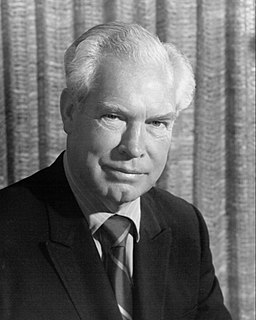A Quote by Edna Ferber
There are people who have a penchant for cities-more than that, a talent for them, a gift of sensing them, of feeling their rhythm and pulsebeats, as others have a highly developed music sense, or color reaction. It is a thing that cannot be acquired.
Related Quotes
You need eyes that tell the dog who watches them what you are feeling toward it, even though the message may be hidden from the outside world. Above all, you nee telepathy so that the dog thinks with you. These things are not always born in people. They can be developed as any sense or gift can be developed. That is, providing the person wishes to develop them is honest in mind, because with animals you cannot cheat.
People see so many things in the paintings. Although I never think of them, it charms me a little bit that people actually project actual scenarios on to the paintings. Hopefully that means that they have a little bit of life to them. Figuring out the rhythm, the structural element has been the key thing in this work, more than the color element. It really was the variety of different widths that lead to a certain movement, a rhythm. Otherwise I'd fall into anything that was too stripy or almost like bar codes, and it thwarted the natural flow of the painting.
Music expresses feeling, that is to say, gives shape and habitation to feeling, not in space but in time. To the extent that music has a history that is more than a history of its formal evolution, our feelings must have a history too. Perhaps certain qualities of feeling that found expression in music can be recorded by being notated on paper, have become so remote that we can no longer inhabit them as feelings, can get a grasp of them only after long training in the history and philosophy of music, the philosophical history of music, the history of music as a history of the feeling soul.
People who hold on to grudges, insist on being right, and try to change other's minds have a difficult time maintaining healthy, happy relationships. Surrendered people easily forgive. They are open to new ideas, and aren't attached to being "right." As a result, people love working and collaborating with them. Others seek them out as mediators and advisers. They are more laid back and relaxed than their rigid counterparts, which makes them highly valued by others.
People who hold on to grudges, insist on being right, and try to change other’s minds have a difficult time maintaining healthy, happy relationships. Surrendered people easily forgive. They are open to new ideas, and aren’t attached to being “right.” As a result, people love working and collaborating with them. Others seek them out as mediators and advisors. They are more laid back and relaxed than their rigid counterparts, which makes them highly valued by others. They are passionate and emotional.
Have you seen how fish are able to swim in a school so precisely relating to their fish-fellows and never clumsily bump into one another? That's because they have a highly developed sense of feeling in their bodies, which enables them to feel not only the movement of the water against their skin but the presence of other beings who are close. They certainly are not cold-blooded in the sense that they are dull, insensitive, and have no feelings.
There are people at the extremes who aren't able to do anything musically, and then others sort of fall in the middle. And the same thing with math, and the same thing with art. You'll find people who are geniuses, or prodigies at the far end of the bell shaped curve, and I think you will find some of the acquired savants in that category who happened to have been endowed with that kind of talent, which explains why not everyone becomes an acquired savant.
Feeling different, feeling alienated, feeling persecuted, feeling that the only way to deal with the world is to laugh - because if you don't laugh you're going to cry and never stop crying - that's probably what's responsible for the Jews having developed such a great sense of humor. The people who had the greatest reason to weep, learned more than anyone else how to laugh.






































